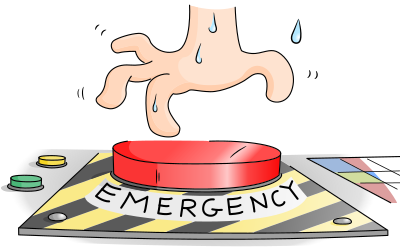On facing uncertainty
A.K.A. Hold the line
(15-20 min skim)
I have some bad news for you. Tomorrow is going to signal the end of the world (again).
Oh, and it’ll start in your house. Sorry. I’m not exactly sure how it will transpire though. It might be a zombie apocalypse, a rift in the time-space continuum caused by the supercollider beneath your house (didn’t you know about that?) or the people of Narnia finally mounting an assault through your closet.

Anyway, good luck and let me know how preparations go.
Given the above, it’d be impressive if you managed to pull off more than stocking up on Cheetos and keeping a baseball bat by your bed. The above is frustrating to prepare for as you don’t exactly know what you’re preparing for. All you know is that it will suck. And that is precisely why uncertainty is such a nasty opponent; you have no idea what you’re even opposing. It’s a call-to-action which puts you on the spot and demands action… only you’re not exactly sure what this action is.
When companies flag problems of uncertainty, it’s often that they’re being asked to prepare for something, but it’s not clear exactly what it is they’re preparing for. If whispers of company performance stalks the water cooler, employees feel uncertain of whether there’ll be a job to come to. Heck, the general quip of “uncertain times” often pertains to the problem that long-term goals are often so fraught that, even if you pick a good path and invest your time in it, it could vanish at any given moment.
The strangest bit about this is, even if you’re in a strong position, uncertainty can be punishing. If you cannot alleviate the alarm bells, you pretty much have to subsist in a permanent state of vigilance: Always being ready to spring into action, but never getting the satisfaction of being able to do so.
And if you can’t get the satisfaction from sending uncertainty packing, what joy is there to be had?

1. Separate the “if” from the “how”
Though uncertainty has the same crappy taste, it has two distinct styles. The first step to besting it is to know which one you’re up against.

A “how” problem is when you know you need to do something, but are not entirely sure how you would go about doing so. For example, you might know that you need to find a job or bounce back from your relationship falling apart… But if it’s not something you’re familiar with and are not confident that you will do it correctly (especially if you’re certain that others have already figured this one out), the temptation is to hold fire until you have a clearer idea. Until such a time it feels like you’re on the right path though, a “how” problem can feel quite relentless.
Luckily, the way to approach the “how” is almost always the same: Taking one step; even if that step is simply “find out what the next step is”. It doesn’t matter if this step only scratches the surface or is even the right one. By chipping away at a problem, you are either moving towards its resolution or gathering valuable information on how to do so.
While I may make this sound simple… I confess that I get blindsided by it repeatedly. When finishing up uni and needing a job, I didn’t know how where to begin looking so I did the obvious thing: Nothing. It turns out that it didn’t solve the problem. When I got stuck with how to improve my piano playing, I knew the things I didn’t want to play but wasn’t actively hunting around for things I did. Funnily enough, that problem stuck around too. Do I sulk and get annoyed about having to work blind? Sure I do. Does it actually fix the problem though, often yes.

In many respects, the solution is similar to that covered in What Streets of Rage 4 taught me about life: Work through the suck.
Now an “if” problem… that’s the nasty one.
As the name implies, an “if” problem is one where you’re not sure if you’re even going to have to enact any kind of contingency at all. This is the whispers of possible redundancies at work, the unhappy relationship or even health concerns. Personally, I believe this one is the worst of the two. At least if you know you have to man the battle stations, you can chuck everything behind it. But here… enacting contingencies prematurely can often leave you worse off than if you never have to push the emergency button in the first place. So you’re stuck in the limbo of keeping one hand hovering over it, figuring out where the all-important line is when you hit “go”. Worse, in never committing your full resources to either, you also to grapple with the incessant worry that straddling the two may even harm both outcomes.
It is astonishingly, and quite unexpectedly, exhausting. As such, it tends to need a more careful approach:

2. Ready your parachute
If we look at the crux of the “if” problem: What gives uncertainty its teeth is the menacing air of “all or nothing” – That if your plan A fails, you’ve had it. Though the obvious first step would be to not let Plan A fail, by the time you’re starting to feel uncertain… the “all” of the “all or nothing” is probably looking pretty shaky.
The remaining option then is to address the “or nothing” instead. Whether a Plan B or simply damage control, are there ways you can mitigate Plan A falling through? At a high level, you’ll want to look at what the damage is that you’re afraid of… and work from there, seeing if you can cushion, mitigate or even outright destroy each one. It’s easy to mistake uncertainty for fear that Plan A will fail when, it’s likely more a fear of what will happen if it does. Crack that and you’ve just kneecapped the sucker. If you cannot crack a problem, then your next best bet is to find a way to give yourself the time to.
Facing redundancy at your workplace is terrifying. But it’ll be easier if you know you can survive for several months and already have an up-to-date CV making the rounds. Your relationship hitting the rocks is awful, but is more manageable if you know you have the networks in place to support you if it goes up in smoke.
Now some fear that planning an escape route is tantamount to “having your eye on the door” or being complacent (as they weirdly believe that unless you’re panicking about something, that you’re not invested in its outcome). But I don’t believe that’s true. Having contingencies doesn’t mean you have to give up on gunning for Plan A. All it means is, if uncertainty calls your bluff and lashes out, you’re already one step ahead of it.

Sometimes what you fear might also be small or hidden behind others. I had an interview in the pipeline and couldn’t shake feeling unsettled about it. Whilst I tried to remedy it with some general revision, it took a while to spot that it was only a couple of specific questions in particular that I was worried about coming up. Once I had answers readied for those ones, I found myself able to relax.
Remember as well that readying your parachute also doesn’t mean that you have to go at this alone either. Some problems are too destructive to attempt to brace on your own shoulders, so reaching out to friends or specialised organisations shouldn’t be overlooked. Grudgingly, not every situation will have a rosy outcome available to it either. Some reprieves will take time to fall in place (such as having a back-up job come through for you) and others are just so destructive that you can’t avoid getting deeply hurt by it. There is sadly no easy way around this, other than trying to mitigate what damage you can, even if it’s just as they say in medicine: “get as comfortable as possible”.

3. In fact… Ready several
You don’t just want a Plan B however, if you can. Until that Plan B is sitting squarely in your lap in a neat bow, you want back-ups, back-ups to your back-ups and so forth.
Though it may seem overkill, it’s likely that you’ve had to spin up your Plan B in a hurry. As such, it may be more susceptible to setbacks than your Plan A was. And if luck hasn’t treated your Plan A very kindly, then it’d be daft to expect it to let up on your others (I’ve seen this at work repeatedly whenever a project faces a setback). Being on the back foot is one of the worst places for multiple things to go wrong, so arriving with plenty of spares will help you extensively.
In fact it’s this, I believe, which is the secret to people who appear impressively able to adapt to change. They have a ton of back-up plans up their sleeves, ready to start work on when required. That’s not to say that they’re all fully-formed or even extensively thought through… but it’s mentally bracing yourself early to action contingencies when required. And that’s obviously considerably easier when you’ve already packed them.


4. Stagger your focus

You will need rest.
Given that “if” problems tend to be very chronic, you’re unlikely going to be able to send it packing with a single, well-aimed coup de grace. As such, burnout is a very real possibility. If you exhaust yourself worrying, you’ll leave yourself little reserves to be able to actively work against the problem… thus the spiral continues.
A good way to strike the balance is to set quantifiable goals for how much (or how often) you’ll work on the given problem. That may be sending out X number of job applications per day, or setting aside X numbers of hours per week working on your contingencies. You basically want definitive lines in the sand where you can tell yourself “ok, I can rest now”, knowing that you are making meaningful steps towards to the resolution.
In effect, what you want are very clear “on / off” elements of your day, by trying to ward away the grey in-between-skiving where you are neither resting nor being productive.

5. Stay in the boat (Don’t be rash)
My wife’s parents have a lovely phrase they use in the face of harsh uncertainty. It is simply: “Stay in the boat”. Regardless of what buffets you, sometimes one of the most important things to do is to pull the oars in, grab hold of something and stay in the damn boat.

This is not be confused with not acting at all. Waiting to be greeted by a waterfall makes for a pretty naff game plan. It’s more that, when you go through an uncertain patch, decisions that offer brief respite but come with heavy long-term damage will start to look incredibly tempting.
The other year, I really wanted to pack in my job. It had been on my mind for a while and having my timelines scuppered by other factors only exacerbated this. It would have been a foolish gamble, however, as I didn’t even know where I’d be living for the next little while, so the respite from jettisoning would have been offset by a bigger hill to climb down the road. In the end, I stuck it out, gave it my all and added monthly treats to remind myself that the trade-off was not in vain.
There may come a point where you need to jump ship, but that doesn’t mean jumping without a life jacket, if you follow the logic.

6. Keep your health

This one may sound pretty obvious. But health tends to be bumped pretty quickly down the priority list when uncertainty kicks in. Either it’s through being too busy trying to get a handle on the situation or, more likely, “it’s not like I have much else going for me at the moment. Allow me this croissant”. I guess you could call it the “sod it mentality” – Feel free to replace the first word with whatever expletives you desire (I promise not to tell).
Quite simply, if you don’t feel like there is much of a future ahead for you (even if you tacitly know this is not necessarily the case), then it is incredibly hard to motivate yourself to invest in it. Instead, the booze calls out because, screw it, it’s not like you have much else to live for – at least that’s what it feels like.
Until you’ve made it to the other side (or know you will), there can be little to silence uncertainty, which means the temptation to turn to distractions increases in a bid to get some respite.
There is, sadly, no real short-cut to this one. A few things, however, that may make things easier:

Where possible, reign in your priorities to little more than: Your parachute(s), your health and whatever else you need to keep afloat (such as turning up to work and not killing your kids). You’re not going to have a great deal of reserves and having to force attention on your health might take more wherewithal than normal, so keep your to-do list as lean as possible for a while to give yourself a fighting chance.
Seeking alternative distractions will also help massively (more on this next). You’re going to stand no chance if you just try and cut out temptations entirely, so substituting them with less damaging ones will help go some way to scratching that itch. An hour of your favourite TV show won’t be as bad as inhaling that tub of ice cream. Rocking out to your favourite tunes in your PJ’s compared to that bottle of spirits will be easier on both your wallet and sleep. Look, I know “so last night I binged on a massive bowl of pasta” doesn’t make for an interesting story… But there’s a time to try and impress others and a time to not make your life irreparably harder. Without your health, you have nothing (unless you have invested in a particularly good Ouija board).

7. Shake up your pleasure
I initially didn’t mean this in a dirty way… but you know what… if it helps you get through this, go for it.
There’s a belief in some circles that if you associate positive moods with particular experiences, then bringing those experiences to bad situations will help bring out the feel-goods (by way of conditioning). If it works for you, great. But generally I’ve found that the complete opposite tends to happen: A bad mood is so distracting that it starts to ruin my enjoyment for whatever I previously got a kick out of. My assortment of reliable feel-goods now becomes a disappointing lunchbox of meh. Oh and the bad mood steals my lunch money.
Situations like this are perfect for an overhaul: New books, new tunes, new games… heck, new hobbies. If you’re already in a state of disruption, leverage this to try new (and stupid) things.

The primary reason that this is so effective is because novelty is incredibly distracting. When your normal go-tos become habitual to the point that your brain can switch to auto-pilot, it makes it far too easy to ruminate and dwell on whatever is bothering you. By waving something new in its face, it has a harder time multi-tasking in this way. Is it a long term solution? No. But at this point, even small patches of respite will do and you’re definitely going to need them.
As an added bonus, if it gets you through but is largely discarded by the way-side (much like classic break-up songs), big deal, it’s not like you were invested in this thing anyway. Alternatively, you could end up discovering something new and awesome that sticks around for a long time after. Either way, you win. So if there’s anything on your radar that you’ve been umm’ing and ah’ing about… now’s the perfect time to chuck it in the way as sacrificial fodder.

8. Find wins… anywhere
When you feel like there isn’t much of a future waiting for you (even just in the interim), it’ll be hard to feel upbeat about anything. In particular, when it feels like the big important things in your life are hammered by a setback, it’ll feel trite to celebrate the smaller things.

To be really blunt, now is not the time to be picky. Once you’ve got your parachutes good to go and are waiting for the payoff, you just need something to keep you going. What you’ll be needing more than anything are results (no matter how small) which show that your actions can mean something. A sense that your actions can influence the outcome… even just a little. It doesn’t matter where you find them.
The reason this practice is sometimes looked down upon is that fixating on the silly wins is sometimes used as a substitute for working towards the bigger things that matter. If you’re working on your shiny Pokémon collection whilst your life goes to crap… well yeah, maybe you need to rethink your priorities. But if you’re making meaningful steps towards having your life in order… Then what exactly is the big deal?
The advantages are two-fold. Firstly, keeping yourself afloat and motivated to keep trying is never a bad thing. But secondly, small wins also give you something nice to look back on once it’s all over. Whether that’s discovering a new band, finishing a game or making a new friend… it’s not that any of these necessarily make the rough patch worth it, but they mean it wasn’t in vain either. It’s a subtle message to yourself that says that even when things suck, there are still good bits to be found – even if you have to look a little harder than normal.

9. Hold the line
Gamers may be familiar with the concept of a “Survival Mission”. Whilst most levels are built to be winnable, these ones are purposefully rigged against you to lose. In the face of this, you have but one objective: To hang in there until help arrives.
If designed well, these are often very tense and exciting, in part because you have to helplessly watch everything fall apart as you desperately consolidate everything to make as best a stand as long as possible. Losses and collateral become an expected part of play, as the focus draws purely to hanging in there, rather than trying to keep all the plates spinning. That mentality is very useful here.

Even if you’ve readied your parachutes, relief is often not immediate. If you’re looking to leave your workplace, home or relationship… you’ll often have numerous ties, notice or transition periods to sort through before you’ve made it safely to the other side. Even with help on the way, this can be tough. One of my friends put it best when they noted “even though I’m leaving this job, there’s just no let-up on the transgressions”. At this point, it’s highly likely that things will get worse as you begin move away from the things you previously invested in and upheld. It’s frustrating seeing the plates you studiously kept spinning shatter before you’ve even left the building.
However, there’s a time and place to fight for good practices and a good legacy. Now is not one of them.
At the point you have an (eventual) way out of your uncertain situation – even if only a temporary reprieve – you’ll have an easier job staying sane by picking and choosing your fights. By this, I mean acknowledging that many simply cannot be won, and therefore only picking the ones that you really need in order to get to the other side. Often that can mean biting your tongue and playing nicely until you’re out of the building. Don’t worry, you can still burn those bridges – just not when you’re running across them.

10. Find your strength, whatever form it may take
I apologise for the awful title. However, the point is: If you’re reading this, then the chances are you’ve already overcome adversity before. Many times, in fact. So the question here is: “What got you through?”
The last ingredient to everything above is the strength to see it through. How you muster that is up to you. You’ll know what that looks like better than I.

It took me ages before I discerned why I was having a hard time keeping my head above the water, despite having many parachutes in place. I knew what I had to do, but that didn’t stop me being pissed off about having to do so. My “gotcha” was spotting that I had un-learned a very valuable trait from my teenage years. Here’s the thing, I’m not courageous. I’m not known to pull 11th hour turnabouts. Heck, I’m not even very good at believing that everything will work out.
But there was something I was damn good at… And that was being defiant.
Don’t get me wrong. I was a goodie-two-shoes, but I was most definitely stubborn. What got me through problems wasn’t necessarily believing that I was going to win… but more refusing to lose to it. And that was what I needed. I struggle to meet adversity face-on with a smile… but a scowl? That I can do. It doesn’t take courage or self-belief. All I needed was to dig my heels in, and that was surprisingly easy to call upon when you’re already annoyed.
What your ace-in-the-hole will look like, I don’t know. However, once your parachutes are in order and rescue is on its way in one form or other… the gloves are off. There’s no real right or wrong way to give yourself boosts to tough out the rough patches, aside from anything that obviously undermines your continuing efforts. Band-aid solutions are only sucky when used instead of addressing the underlying problems. Once you have those in motion though, there’s no shame in pulling out all the stops. Whether the approach is seen as “cool” or not is irrelevant. If you have to shout in the mirror, do a silly dance, talk at your pet or stare into space… It really doesn’t matter if it gives you the resolve to keep at it.
And with that, go get ‘em!



 Squid and Whimsy
Squid and Whimsy

